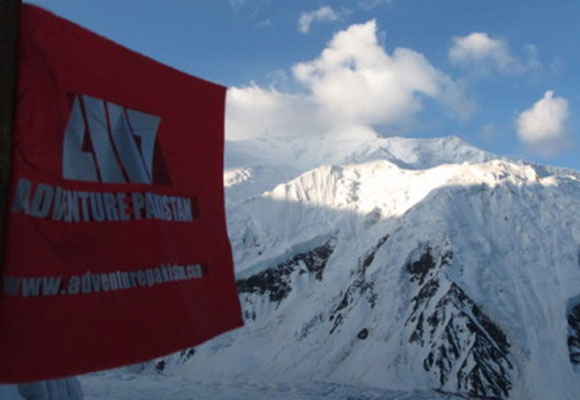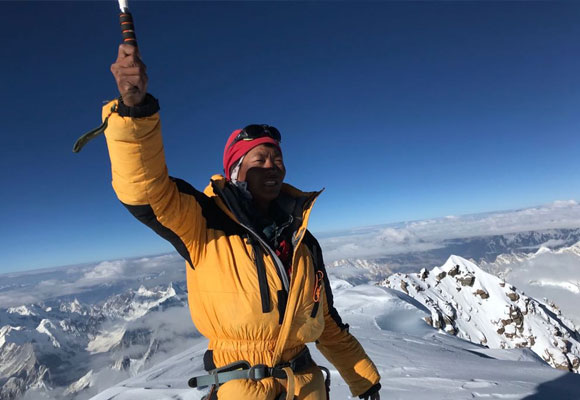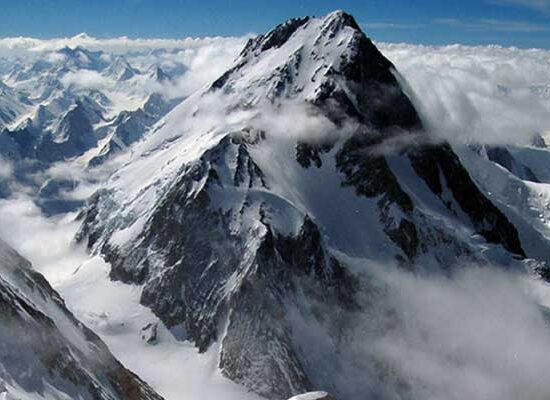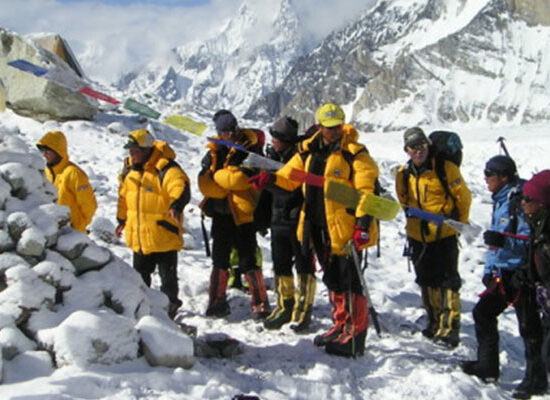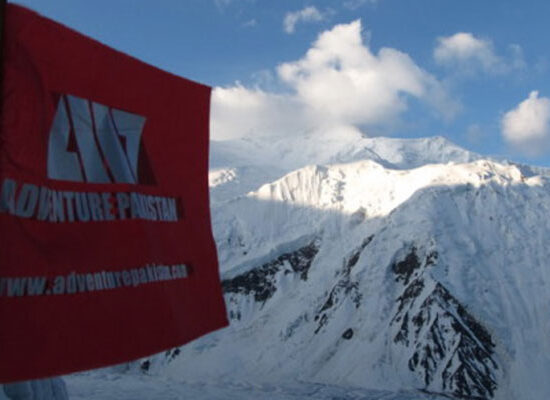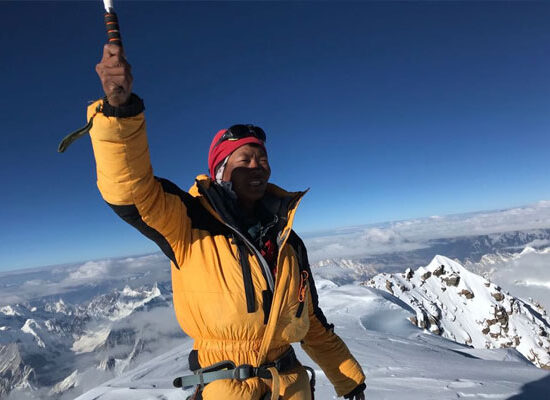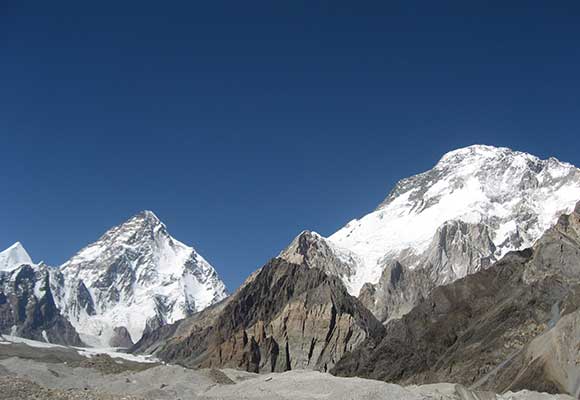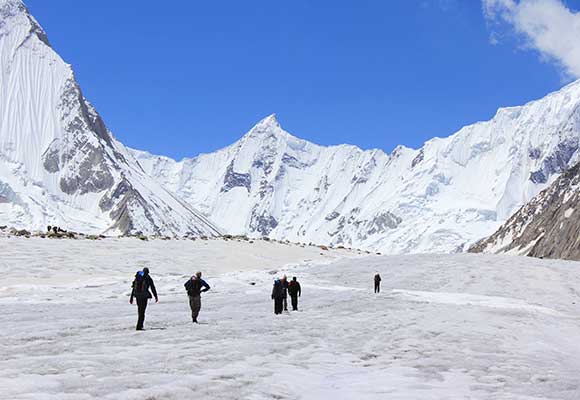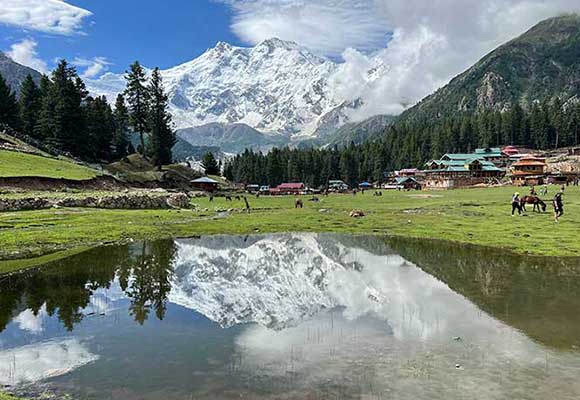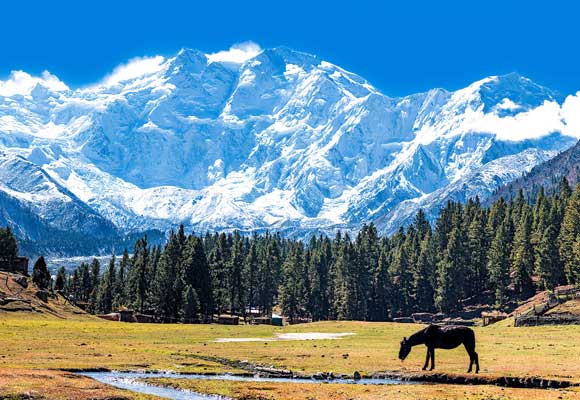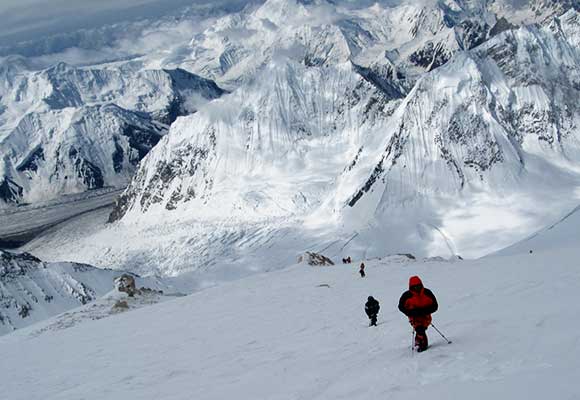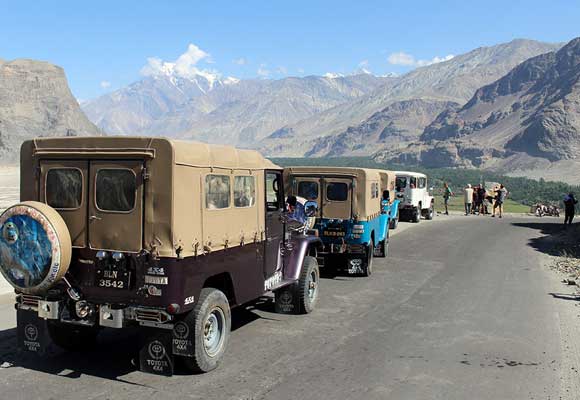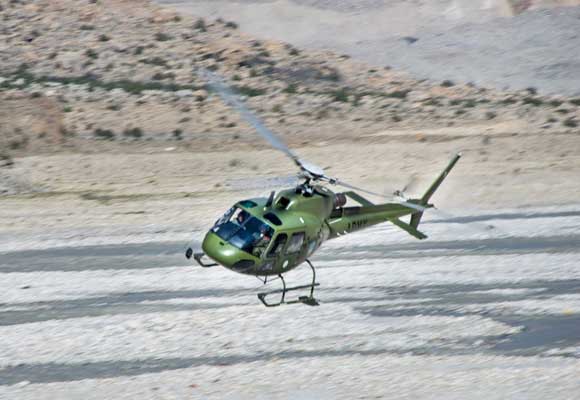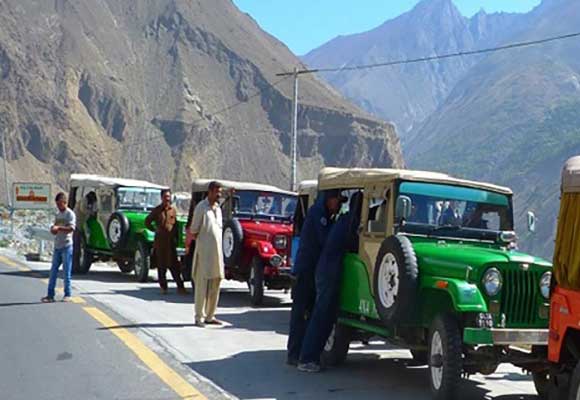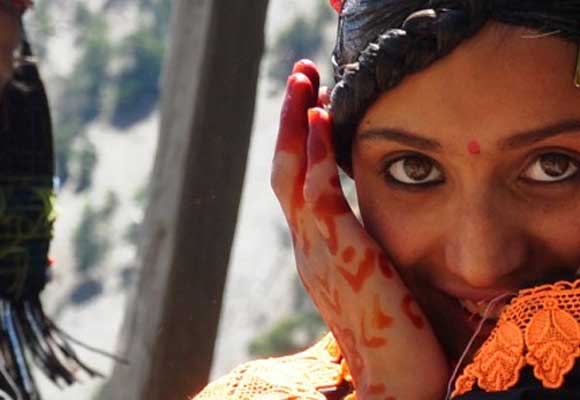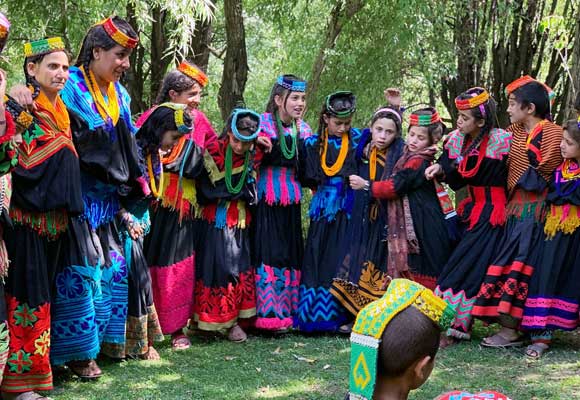Gasherbrum 1 Expedition (8068m)
OVERVIEW & ITINERARY
dETAILS
Mt. Gasherbrum I is the 11th-highest peak in the world. It is located in the Gilgit Baltistan region of Pakistan. Gasherbrum I is a part of the Gasherbrum massive, located in the Karakoram region of the Himalayas. Gasherbrum is a remote group of high peaks in the Karakoram, located at the northeast end of the 36-mile Baltoro glacier. Mt.G-I is regarded as a bit more challenging than Mt. G-II. Mt. G-II (8035m/ 26362ft) is the 13th highest mountain in the world. G-I and G-II are the most remote 8,000m peaks.
The group forms a semi-circle around its own South Gasherbrum Glacier. A French Expedition led by H. De Segogne made the first attempt in 1936, but they could not climb beyond Camp V at a height of 6797 meters. However, in 1958 an American Expedition led by Nich Clinch made the first ascent of Gasherbrum I. Pete Schoening and Andy Kaufman were the first to reach the summit.
Gasherbrum I is the “least popular” of the 8000-meter peaks. It is also one of the peaks with the least deaths, but this probably has to do with the fact that only really experienced mountaineers try a peak as difficult as Gasherbrum I. The peak was also the venue of the world’s first 8,000-meter climb in pure Alpine Style. This means that the start of the climb is done from the bottom of the mountain and all gears are carried on the way, if any bivouacs, they will be found on the way. The most common way to climb the peak is to attack the western side and all routes here lead to “The Japanese Couloir”, which is located on top of the north-west face. The first ascent (1958) was made via Spur Peak and then via the long southeast ridge to the summit.
ITINERARY
HIGHLIGHTS
Majestic Karakoram Exploration:
Venture deep into the heart of the Karakoram Range, immersing yourself in its stunning beauty and diverse mountainous terrain.
Aerial Views of Nanga Parbat & K2:
Soar through the skies and enjoy spectacular aerial views of both Nanga Parbat and K2, two of the world’s most iconic peaks, creating a mesmerizing backdrop for your journey.
Balti Hospitality and Culture:
Experience the warm hospitality and rich culture of the friendly Balti people, gaining insights into their traditions and way of life.
Top Climbing and Mountaineering Adventure:
Engage in one of the world’s premier climbing and mountaineering adventures as you ascend the formidable Gasherbrum I, surrounded by the unparalleled beauty of the Karakoram.
Ancient Himalayan Kingdom of Baltistan:
Explore the ancient Himalayan Kingdom of Baltistan, steeped in history and cultural heritage, where every step unveils the legacy of centuries gone by.
Concordia and the Baltoro Glacier:
Experience the awe-inspiring Concordia, a unique glacial intersection surrounded by towering peaks, and trek along the majestic Baltoro Glacier, one of Pakistan’s natural wonders.
High-Altitude Adventure at Gasherbrum I:
Undertake the challenge of ascending Gasherbrum I, navigating through technical terrain and pushing your limits in pursuit of the summit.
Journey through Ancient Pathways:
Follow ancient pathways as you explore the region, connecting with the land’s history and the mountaineering legacy that echoes through the valleys.
Spectacular Mountain Views:
Revel in the ever-changing and breathtaking views of the surrounding peaks, creating a backdrop that evolves with each step of your expedition.
Camping in the Wilderness:
Set up camp in the pristine wilderness of the Karakoram, where the crisp mountain air and the silence of the surroundings become integral parts of your high-altitude experience.
Panoramic Views of Concordia:
Absorb the panoramic views of Concordia, a place where the mightiest peaks converge, creating a natural amphitheater that amplifies the grandeur of the Karakoram Range.
challenging eight-thousander
very high safety standards
Long trek to basecamp is perfect for good acclimatization
EXPEDITION DATES
Start Date |
End Date |
Price |
Deposit |
Status |
|
20 June 2024 |
08 August2024 |
USD $12000 |
USD $1000 |
Guaranteed |
WHAT'S INCLUDED
- ARRIVAL AND DEPARTURE: Airport - Hotel transfers – Airport (Pick Up and Drop), by private vehicle.
- ACCOMMODATION IN ISLAMABAD: 3 nights hotel at 4-star Hotel in Islamabad on bed & breakfast Basis- Sharing Twin Bed Room.
- WELCOME DINNER: 5 nights hotel in Skardu on Bed and Breakfast plan.
- CARGO CLEARANCE: Assistance for cargo clearance in Pakistan’s Customs, clearance cost is subject to a charge.
- PERMIT: Expedition Royalty and a permit fee of the PAKISTAN Government to climb Mt. G-1, for members.
- LIAISON OFFICER: 1 Government Liaison officer with full equipment, salary, and accommodation.
- GARBAGE MANAGEMENT: Stool Shipment Transfer & Garbage Deposit fees.
- INSURANCE: Medical Insurance for all Pakistani staff during the trek and expedition.
- MAP: Trekking and climbing map.
- DUFFLE BAG: One Adventure Pakistan, Treks, Expeditions Duffle Bag.
- MEMBER TRANSPORTATION: (Domestic Flight) Fly from Islamabad to Skardu and while returning from Skardu to Islamabad, as per itinerary, along with one guide. - LAND TRANSPORTATION (MEMBERS): Drive by jeep Skardu to Askole and on returning Askole to Skardu. - LAND TRANSPORTATION (STAFF): Islamabad to Askole via Skardu (by bus/jeep) for all climbing Sherpas and expeditions staff. (Members and staff will meet each other in Skardu).
- EXPEDITION STUFFS TRANSPORTATION: All necessary expedition equipment transportation for all Members and Staff (by air cargo) – Islamabad to Askole (by truck/jeep) and Base camp (by Porters/mules) – While returning: Base camp to Askole (by porters/mules) and Askole to Islamabad (by Truck/jeep). Based on the condition, different transportation variants may adopt.
- MEMBER LUGGAGE: Up to 60 Kg per member for personal baggage during the trek to be carried by porters or Mules.
- FOOD AND LODGING: 3 meals a day (breakfast, lunch, and dinner; including tea and coffee) along with accessible accommodation at Hotel/Lodge/TENT during the trek and at the Basecamp. Hygienic vegetables, meat, fruits, soft drinks, and juice will be served during the entire expedition. Well-managed base camp set up for members & Staff.
- CAMPING: All necessary logistic arrangements for Camping during the trek.
- PORTER: Porters per member up to the basecamp and from the basecamp (both ways).
- BASE CAMP STAFF: Experienced and well-trained Base Camp Cook & kitchen Helpers as required.
- BASE CAMP COOK: Pakistani well-trained professional cook for the team.
- STAFF SALARY AND ALLOWANCE: All staff & porter’s daily wages, salary, equipment, food & clothing.
- BASE CAMP TENT: Each member will have an individual box tent in Base Camp.
- BASE CAMP EQUIPMENT: Single Tent, foam mattresses and pillow per member, 1 Dinning Tent, 1 Kitchen Tent, 1 Communication tent, 1 Toilet & 1 Shower Tent, 1 Staffs Tent, Store tent, Tables & chairs & all necessary cooking gears.
- SOLAR/GENERATOR/LIGHT: 1 Solar panel and Generator for lights at base camp, FOR battery charges, laptop, and other electronic devices.
- SATELLITE PHONE: Satellite Phone for emergency communication carried by Sherpa, also available for members (SUBJECT TO A CHARGE).
- WALKIE-TALKIE: Walkie–Talkie for communicating from Base Camp to Mountain and Mountain to Base Camp.
- PERMITS: Gasherbrum I climbing certificate issued by Pakistani Alpine Club (after climbing Gasherbrum I successfully).
- MEDICAL KIT: Comprehensive Medical kit for members and staff.
- CERTIFICATE: G-1 climbing certificate issued by PAKISTANI ALPINE CLUB (after climbing Mt. G 1 successfully).
WHAT'S NOT INCLUDED
- AIR FARE : International flight airfare (from and to Islamabad).
- PAKISTAN ENTRY VISA FEE : PAKISTANI Visa fee for 90 DAYS.
- LUNCH & DINNER : Lunch & dinner during the stay in Islamabad and Skardu (also in case of early return from Trekking / Expedition than the scheduled itinerary).
- EXTRA NIGHTS IN ISLAMABAD & SKARDU : Extra nights’ accommodation in Islamabad & Skardu. In case of early arrival or late departure, early return from Trekking / Expedition, or domestic flight cancellation (due to any other reason) than the scheduled itinerary.
- INSURANCE POLICY : Insurance covering both medical and high-altitude evacuation costs (for the trip cancellation, interruption, high-altitude rescue & air evacuation, medical treatment, repatriation, etc.) *Mandatory
- PERSONAL EXPENSES : Telephone Calls, Internet, Toiletries, battery recharge, hot shower, laundry, soft drinks, beers, and any Alcoholic beverages (during the trek and in Islamabad & Skardu but we will have soft drinks for members at base camp).
- PERSONAL CLIMBING EQUIPMENT : Clothing, Packing Items, Bags, Personal Medical Kit, and all kinds of Personal Trekking / Climbing Gear.
- TOILETRIES : Soaps, shampoos, toilet and tissue papers, toothpaste, and other items used to keep yourself clean.
- FILMING : Special Filming, Camera, and Drone permit fee.
- INTERNET SERVICE : Not included during the trek.
- TIPS : Calculate some tips for basecamp and high camp staff – Minimum 500 USD.
- EXTRA : Any other services or activities, which are not mentioned in the itinerary and not listed in the “Cost Includes” section.
ROUTE MAP
Find a route from your location
gallery
Frequently asked questions
What will the weather on the K2 Base Camp Trek be like?
The temperature will vary a lot and in general the weather is becoming more unpredictable due to climate change. The first few days of the K2 trek can be very hot around 30 degrees or even more and after that it will become cooler, in the night it can be between 10 to -10. It is of course also possible that it rains or snows. Kindly find a detailed overview below:
Islamabad:
Characterized by high humidity and potential monsoon rain occurrences.
Average Temperatures: High: 35°C / 95°F, Low: 24°C / 76°F.
Skardu:
Days range from warm to hot without humidity.
The bustling bazaar road is often dusty.
Evenings provide cooler and delightful conditions.
Possibility of wind and dust storms.
July experiences the warmest weather.
High: 23°C / 73.4°F, Low: 10°C / 50°F.
Note: Due to the heightened sun exposure in the mountains, temperatures can feel warmer than they actually are.
3,000 – 3,500 Meters:
Daytime conditions: Hot, exposed, and dusty.
Nights: Cooler, but not typically freezing.
Unlikely possibility of snow at approximately 3,500 meters.
Development of cloud cover is conceivable at any elevation.
3,500 – 4,500 Meters:
Daytime warmth persists, while mornings and evenings exhibit a chill.
Night temperatures can dip below freezing beyond 4,000 meters.
Rain, snow, and cloud cover can manifest at any juncture.
Greater presence of ice on the Baltoro Glacier.
4,500 – 5,600 Meters:
Nights encounter freezing temperatures.
Days range from cool to cold, with intermittent warm sunshine.
Continuous potential for rain, snow, and cloud cover.
The trail between Concordia and Ali Camp is likely to be covered in deep snow.
Trekking on icy and snowy surfaces from Concordia to K2 Base Camp.
Gondogoro La ascent/descent could encounter a substantial snow pack.
Coldest temperatures could dip to around -10°C / 14°F.
What will the food be like on the trek?
Breakfast: Typically includes an omelet / fried / boiled eggs, fried Pakistani bread (paratha), chappati, toast, pancakes, porridge, cereal, jam, Nutella, honey, marmalade, cheese etc + green tea / coffee / milk tea.
Lunch: unlike other trekking agencies we do not provide packed lunch instead we will have fresh lunch which includes soup, tuna fish, boiled pottatos, eggs, assorted cookies, bread, cheese, dried fruits & nuts, green tea / coffee / juice
Dinner: we start each dinner with a nice warm soup, after that there will be variation of dishes which changes each day. different vegetable dishes, varies types of meat (chicken, beef or mutton) accompanied by rice, noodles, pasta, lentils, potatoes, French fries and or chappati bread. We of course won’t forget dessert, there will be (fresh) fruit and or a type of pudding at every dinner.
Snacks: between lunch and dinner there will be a daily variation of cookies, pakora, popcorn etc. and hot beverages
Note: we will also take into account your specific dietary requirements, for example vegetarian / vegan / lactose intolerant – please don’t hesitate to contact us about the possibilities.
Will we fly to the mountains from Islamabad?
This will depend on your specific itinerary and your own preferences, where possible. For the standard K2 and K2 Gondogoro La and Snow Lake treks we normally schedule the flight on day 2 of your itinerary where we will fly from Islamabad to Skardu. This is a very scenic flight, if the weather is clear you will be able to get amazing mountain views including the 9th highest mountain in the world, Nanga Parbat. When the weather is bad the flight to Skardu might get cancelled, if this happens we will drive in 2 days from Islamabad to Skardu with an overnight stay halfway. There will always be a contingency day in your itinerary to cover for this delay.
What is the luggage allowance on the trek?
Each trekking member has a 15 kg baggage allowance. This is for your main luggage that will be carried to each camp each day of the trek. You yourself are only required to carry a small daypack while trekking – here you can put anything you might need during the day like water, energybars, sunglasses, suncream, clothing etc. If your main backpack/duffle bag weighs more than 15 kg, you will need to pay for the additional weight. Cost for additional weight will be determined on the ground as prices for porters vary by the season. For the K2 treks it is possible to leave excess luggage in our office storage room or at your hotel and pick it up at the end of the trek. Please also kindly note that the baggage allowance on the domestic flights is currently 20 kg check-in and 7 kg hand-carry.
Is there electricity on the trek?
We carry solar panels (no diesel or petrol generators to avoid noise & air pollution), so that each trekking member can charge batteries, power banks, phones, etc while on the trek.
Is it safe to travel in Pakistan?
It is a fair question to ask as we know that most of the news from Pakistan is not so positive, but the image which people have abroad is far from the reality. Although there have been valid reasons for people to consider Pakistan as not very safe, a lot has changed in recent years. The security situation has improved dramatically and the government has been making efforts to promote tourism and facilitate travel. When you visit you will notice immiediately that Pakistanis are very hospitable people, they are eager to get to know you and often will invite you in their home. Pakistan is a huge country, we only offer tours and treks to areas which we deem safe. We currently don’t recommend to travel to the border region with Afghanistan and certain parts of Balochistan but most other places can be visited without any problem. If you prefer to start with the safest region then we would recommend Gilgit-Baltistan in the north, the people here largely depend on tourism for their income and have been warmly welcoming foreign tourist for many years.
Do I need a trekking visa?
For certain types of treks you will require a trekking visa – for example all the K2 treks. If a trekking visa is required then we will inform you accordingly during your booking, there are a lot of treks which are not in a restricted area and therefore you will only need a standard tourist visa.
Can I rent trekking gear from you?
Yes, it is possible to rent certain items from us or we will put you in contact with a trusted local supplier who can provide you with the things you need. Some of the standard gear which we can arrange are crampons, climbing belts, ice axes and climbing helmets.
What happens in case of an emergency during the trek?
On each trek your guide will be in possesion of a phone and where needed (during remote treks) a sattelite phone as well as a medical aid kit. All our guides are aware of the standard emergency protocols and will contact our headoffice staff as well as the relevant authorities when needed. Before you go on a trek with us we will require your emergency contact list as well as your travel insurance details with proper coverage for emergency (helicopter) rescue in mountainous areas. Depending on the situation we will contact your insurance company and together with them will make arrangements for your repatriation. We have many years of experience with search and rescue operations and good relations with all relevant institutions including Askari Aviation for helicopter rescue operations. If you have the right insurance coverage then we will be able to initiate a helicopter rescue immidiately – please kindly note that helicopters in Pakistan always fly in pairs and availability of the helicopters depends on them not being in use on another mission as well as the weather being suitable.
What kind of travel insurance do I need?
This will depend on the type of tour that you are planning. Please make sure to consult your travel insurance before your trip to make sure you have proper coverage for your tour and the activities you will undertake. Especially when you go on a trek it is important to have mountain emergency search and rescue / repatriation by helicopter included in your insurance package.
Is there a recommended dress code?
Pakistan is an Islamic country and it is therefore advisable for women not to wear short skirts / tops or short trousers in public. A headscarf will come in handy for women when they visit a mosque / religious site or sometimes it can be a custom in more remote / conservative areas. Dress codes for men are more lenient, though shorts are uncommon – they can be worn depending on the places you visit on a certain day (for example if you visit a mosque, sacred site or very conservative area it might be better to adjust your clothes to a more modest style – feel free to ask your guide if you are not sure). If you are going on a trek you can wear shorts without any problems.
Do I need a visa for this trip?
For all trips to Pakistan you will require a visa, depending on the the type of tour you will either need a standard tourist visa or a trekking visa. Our sales team will provide you with all the necessary information as well as a visa invitation letter and related supporting documents after you have booked your tour with us.
How much price about tour & travels
Lorem ipsum dolor sit amet, utinam munere antiopam vel ad. Qui eros iusto te. Nec ad feugiat honestatis. Quo illum detraxit an. Ius eius quodsi molestiae at, nostrum definitiones his cu. Discere referrentur mea id, an pri novum possim deterruisset. Eum oratio reprehendunt cu. Nec te quem assum postea.
Who will meet me on arrival?
An Adventure Pakistan representative will meet you at the airport and will bring you to your hotel.
Where do I fly to for this trip?
You will fly roundtrip to Islamabad, Pakistan.
Do I need to bring my own sleeping bag and pad for this trip?
Yes. You will need to bring your own sleeping bag, for the K2 treks and Snow Lake trek during the main summer season we recommend it to be suitable for temperatures up to minus 10 degrees Celsius / 15 Fahrenheit. It is also advisable to bring your own sleeping pad for comfort, please kindly keep in mind that on many days you will be sleeping on rock / snow / ice. For other treks we are happy to advise you on the type of sleeping bag depending on the season and location.
What will the weather on the K2 Base Camp Trek be like?
The temperature will vary a lot and in general the weather is becoming more unpredictable due to climate change. The first few days of the K2 trek can be very hot around 30 degrees or even more and after that it will become cooler, in the night it can be between 10 to -10. It is of course also possible that it rains or snows. Kindly find a detailed overview below:
Islamabad:
Characterized by high humidity and potential monsoon rain occurrences.
Average Temperatures: High: 35°C / 95°F, Low: 24°C / 76°F.
Skardu:
Days range from warm to hot without humidity.
The bustling bazaar road is often dusty.
Evenings provide cooler and delightful conditions.
Possibility of wind and dust storms.
July experiences the warmest weather.
High: 23°C / 73.4°F, Low: 10°C / 50°F.
Note: Due to the heightened sun exposure in the mountains, temperatures can feel warmer than they actually are.
3,000 – 3,500 Meters:
Daytime conditions: Hot, exposed, and dusty.
Nights: Cooler, but not typically freezing.
Unlikely possibility of snow at approximately 3,500 meters.
Development of cloud cover is conceivable at any elevation.
3,500 – 4,500 Meters:
Daytime warmth persists, while mornings and evenings exhibit a chill.
Night temperatures can dip below freezing beyond 4,000 meters.
Rain, snow, and cloud cover can manifest at any juncture.
Greater presence of ice on the Baltoro Glacier.
4,500 – 5,600 Meters:
Nights encounter freezing temperatures.
Days range from cool to cold, with intermittent warm sunshine.
Continuous potential for rain, snow, and cloud cover.
The trail between Concordia and Ali Camp is likely to be covered in deep snow.
Trekking on icy and snowy surfaces from Concordia to K2 Base Camp.
Gondogoro La ascent/descent could encounter a substantial snow pack.
Coldest temperatures could dip to around -10°C / 14°F.
What will the food be like on the trek?
Breakfast: Typically includes an omelet / fried / boiled eggs, fried Pakistani bread (paratha), chappati, toast, pancakes, porridge, cereal, jam, Nutella, honey, marmalade, cheese etc + green tea / coffee / milk tea.
Lunch: unlike other trekking agencies we do not provide packed lunch instead we will have fresh lunch which includes soup, tuna fish, boiled pottatos, eggs, assorted cookies, bread, cheese, dried fruits & nuts, green tea / coffee / juice
Dinner: we start each dinner with a nice warm soup, after that there will be variation of dishes which changes each day. different vegetable dishes, varies types of meat (chicken, beef or mutton) accompanied by rice, noodles, pasta, lentils, potatoes, French fries and or chappati bread. We of course won’t forget dessert, there will be (fresh) fruit and or a type of pudding at every dinner.
Snacks: between lunch and dinner there will be a daily variation of cookies, pakora, popcorn etc. and hot beverages
Note: we will also take into account your specific dietary requirements, for example vegetarian / vegan / lactose intolerant – please don’t hesitate to contact us about the possibilities.
Will we fly to the mountains from Islamabad?
This will depend on your specific itinerary and your own preferences, where possible. For the standard K2 and K2 Gondogoro La and Snow Lake treks we normally schedule the flight on day 2 of your itinerary where we will fly from Islamabad to Skardu. This is a very scenic flight, if the weather is clear you will be able to get amazing mountain views including the 9th highest mountain in the world, Nanga Parbat. When the weather is bad the flight to Skardu might get cancelled, if this happens we will drive in 2 days from Islamabad to Skardu with an overnight stay halfway. There will always be a contingency day in your itinerary to cover for this delay.
What is the luggage allowance on the trek?
Each trekking member has a 15 kg baggage allowance. This is for your main luggage that will be carried to each camp each day of the trek. You yourself are only required to carry a small daypack while trekking – here you can put anything you might need during the day like water, energybars, sunglasses, suncream, clothing etc. If your main backpack/duffle bag weighs more than 15 kg, you will need to pay for the additional weight. Cost for additional weight will be determined on the ground as prices for porters vary by the season. For the K2 treks it is possible to leave excess luggage in our office storage room or at your hotel and pick it up at the end of the trek. Please also kindly note that the baggage allowance on the domestic flights is currently 20 kg check-in and 7 kg hand-carry.
Is there electricity on the trek?
We carry solar panels (no diesel or petrol generators to avoid noise & air pollution), so that each trekking member can charge batteries, power banks, phones, etc while on the trek.
Is it safe to travel in Pakistan?
It is a fair question to ask as we know that most of the news from Pakistan is not so positive, but the image which people have abroad is far from the reality. Although there have been valid reasons for people to consider Pakistan as not very safe, a lot has changed in recent years. The security situation has improved dramatically and the government has been making efforts to promote tourism and facilitate travel. When you visit you will notice immiediately that Pakistanis are very hospitable people, they are eager to get to know you and often will invite you in their home. Pakistan is a huge country, we only offer tours and treks to areas which we deem safe. We currently don’t recommend to travel to the border region with Afghanistan and certain parts of Balochistan but most other places can be visited without any problem. If you prefer to start with the safest region then we would recommend Gilgit-Baltistan in the north, the people here largely depend on tourism for their income and have been warmly welcoming foreign tourist for many years.
Do I need a trekking visa?
For certain types of treks you will require a trekking visa – for example all the K2 treks. If a trekking visa is required then we will inform you accordingly during your booking, there are a lot of treks which are not in a restricted area and therefore you will only need a standard tourist visa.
Can I rent trekking gear from you?
Yes, it is possible to rent certain items from us or we will put you in contact with a trusted local supplier who can provide you with the things you need. Some of the standard gear which we can arrange are crampons, climbing belts, ice axes and climbing helmets.
What happens in case of an emergency during the trek?
On each trek your guide will be in possesion of a phone and where needed (during remote treks) a sattelite phone as well as a medical aid kit. All our guides are aware of the standard emergency protocols and will contact our headoffice staff as well as the relevant authorities when needed. Before you go on a trek with us we will require your emergency contact list as well as your travel insurance details with proper coverage for emergency (helicopter) rescue in mountainous areas. Depending on the situation we will contact your insurance company and together with them will make arrangements for your repatriation. We have many years of experience with search and rescue operations and good relations with all relevant institutions including Askari Aviation for helicopter rescue operations. If you have the right insurance coverage then we will be able to initiate a helicopter rescue immidiately – please kindly note that helicopters in Pakistan always fly in pairs and availability of the helicopters depends on them not being in use on another mission as well as the weather being suitable.
What kind of travel insurance do I need?
This will depend on the type of tour that you are planning. Please make sure to consult your travel insurance before your trip to make sure you have proper coverage for your tour and the activities you will undertake. Especially when you go on a trek it is important to have mountain emergency search and rescue / repatriation by helicopter included in your insurance package.
Is there a recommended dress code?
Pakistan is an Islamic country and it is therefore advisable for women not to wear short skirts / tops or short trousers in public. A headscarf will come in handy for women when they visit a mosque / religious site or sometimes it can be a custom in more remote / conservative areas. Dress codes for men are more lenient, though shorts are uncommon – they can be worn depending on the places you visit on a certain day (for example if you visit a mosque, sacred site or very conservative area it might be better to adjust your clothes to a more modest style – feel free to ask your guide if you are not sure). If you are going on a trek you can wear shorts without any problems.
Do I need a visa for this trip?
For all trips to Pakistan you will require a visa, depending on the the type of tour you will either need a standard tourist visa or a trekking visa. Our sales team will provide you with all the necessary information as well as a visa invitation letter and related supporting documents after you have booked your tour with us.
How much price about tour & travels
Lorem ipsum dolor sit amet, utinam munere antiopam vel ad. Qui eros iusto te. Nec ad feugiat honestatis. Quo illum detraxit an. Ius eius quodsi molestiae at, nostrum definitiones his cu. Discere referrentur mea id, an pri novum possim deterruisset. Eum oratio reprehendunt cu. Nec te quem assum postea.
Who will meet me on arrival?
An Adventure Pakistan representative will meet you at the airport and will bring you to your hotel.
Where do I fly to for this trip?
You will fly roundtrip to Islamabad, Pakistan.
Do I need to bring my own sleeping bag and pad for this trip?
Yes. You will need to bring your own sleeping bag, for the K2 treks and Snow Lake trek during the main summer season we recommend it to be suitable for temperatures up to minus 10 degrees Celsius / 15 Fahrenheit. It is also advisable to bring your own sleeping pad for comfort, please kindly keep in mind that on many days you will be sleeping on rock / snow / ice. For other treks we are happy to advise you on the type of sleeping bag depending on the season and location.
REPORTS & REVIEWS
Frequently asked questions
What will the weather on the K2 Base Camp Trek be like?
The temperature will vary a lot and in general the weather is becoming more unpredictable due to climate change. The first few days of the K2 trek can be very hot around 30 degrees or even more and after that it will become cooler, in the night it can be between 10 to -10. It is of course also possible that it rains or snows. Kindly find a detailed overview below:
Islamabad:
Characterized by high humidity and potential monsoon rain occurrences.
Average Temperatures: High: 35°C / 95°F, Low: 24°C / 76°F.
Skardu:
Days range from warm to hot without humidity.
The bustling bazaar road is often dusty.
Evenings provide cooler and delightful conditions.
Possibility of wind and dust storms.
July experiences the warmest weather.
High: 23°C / 73.4°F, Low: 10°C / 50°F.
Note: Due to the heightened sun exposure in the mountains, temperatures can feel warmer than they actually are.
3,000 – 3,500 Meters:
Daytime conditions: Hot, exposed, and dusty.
Nights: Cooler, but not typically freezing.
Unlikely possibility of snow at approximately 3,500 meters.
Development of cloud cover is conceivable at any elevation.
3,500 – 4,500 Meters:
Daytime warmth persists, while mornings and evenings exhibit a chill.
Night temperatures can dip below freezing beyond 4,000 meters.
Rain, snow, and cloud cover can manifest at any juncture.
Greater presence of ice on the Baltoro Glacier.
4,500 – 5,600 Meters:
Nights encounter freezing temperatures.
Days range from cool to cold, with intermittent warm sunshine.
Continuous potential for rain, snow, and cloud cover.
The trail between Concordia and Ali Camp is likely to be covered in deep snow.
Trekking on icy and snowy surfaces from Concordia to K2 Base Camp.
Gondogoro La ascent/descent could encounter a substantial snow pack.
Coldest temperatures could dip to around -10°C / 14°F.
What will the food be like on the trek?
Breakfast: Typically includes an omelet / fried / boiled eggs, fried Pakistani bread (paratha), chappati, toast, pancakes, porridge, cereal, jam, Nutella, honey, marmalade, cheese etc + green tea / coffee / milk tea.
Lunch: unlike other trekking agencies we do not provide packed lunch instead we will have fresh lunch which includes soup, tuna fish, boiled pottatos, eggs, assorted cookies, bread, cheese, dried fruits & nuts, green tea / coffee / juice
Dinner: we start each dinner with a nice warm soup, after that there will be variation of dishes which changes each day. different vegetable dishes, varies types of meat (chicken, beef or mutton) accompanied by rice, noodles, pasta, lentils, potatoes, French fries and or chappati bread. We of course won’t forget dessert, there will be (fresh) fruit and or a type of pudding at every dinner.
Snacks: between lunch and dinner there will be a daily variation of cookies, pakora, popcorn etc. and hot beverages
Note: we will also take into account your specific dietary requirements, for example vegetarian / vegan / lactose intolerant – please don’t hesitate to contact us about the possibilities.
Will we fly to the mountains from Islamabad?
This will depend on your specific itinerary and your own preferences, where possible. For the standard K2 and K2 Gondogoro La and Snow Lake treks we normally schedule the flight on day 2 of your itinerary where we will fly from Islamabad to Skardu. This is a very scenic flight, if the weather is clear you will be able to get amazing mountain views including the 9th highest mountain in the world, Nanga Parbat. When the weather is bad the flight to Skardu might get cancelled, if this happens we will drive in 2 days from Islamabad to Skardu with an overnight stay halfway. There will always be a contingency day in your itinerary to cover for this delay.
What is the luggage allowance on the trek?
Each trekking member has a 15 kg baggage allowance. This is for your main luggage that will be carried to each camp each day of the trek. You yourself are only required to carry a small daypack while trekking – here you can put anything you might need during the day like water, energybars, sunglasses, suncream, clothing etc. If your main backpack/duffle bag weighs more than 15 kg, you will need to pay for the additional weight. Cost for additional weight will be determined on the ground as prices for porters vary by the season. For the K2 treks it is possible to leave excess luggage in our office storage room or at your hotel and pick it up at the end of the trek. Please also kindly note that the baggage allowance on the domestic flights is currently 20 kg check-in and 7 kg hand-carry.
Is there electricity on the trek?
We carry solar panels (no diesel or petrol generators to avoid noise & air pollution), so that each trekking member can charge batteries, power banks, phones, etc while on the trek.
Is it safe to travel in Pakistan?
It is a fair question to ask as we know that most of the news from Pakistan is not so positive, but the image which people have abroad is far from the reality. Although there have been valid reasons for people to consider Pakistan as not very safe, a lot has changed in recent years. The security situation has improved dramatically and the government has been making efforts to promote tourism and facilitate travel. When you visit you will notice immiediately that Pakistanis are very hospitable people, they are eager to get to know you and often will invite you in their home. Pakistan is a huge country, we only offer tours and treks to areas which we deem safe. We currently don’t recommend to travel to the border region with Afghanistan and certain parts of Balochistan but most other places can be visited without any problem. If you prefer to start with the safest region then we would recommend Gilgit-Baltistan in the north, the people here largely depend on tourism for their income and have been warmly welcoming foreign tourist for many years.
Do I need a trekking visa?
For certain types of treks you will require a trekking visa – for example all the K2 treks. If a trekking visa is required then we will inform you accordingly during your booking, there are a lot of treks which are not in a restricted area and therefore you will only need a standard tourist visa.
Can I rent trekking gear from you?
Yes, it is possible to rent certain items from us or we will put you in contact with a trusted local supplier who can provide you with the things you need. Some of the standard gear which we can arrange are crampons, climbing belts, ice axes and climbing helmets.
What happens in case of an emergency during the trek?
On each trek your guide will be in possesion of a phone and where needed (during remote treks) a sattelite phone as well as a medical aid kit. All our guides are aware of the standard emergency protocols and will contact our headoffice staff as well as the relevant authorities when needed. Before you go on a trek with us we will require your emergency contact list as well as your travel insurance details with proper coverage for emergency (helicopter) rescue in mountainous areas. Depending on the situation we will contact your insurance company and together with them will make arrangements for your repatriation. We have many years of experience with search and rescue operations and good relations with all relevant institutions including Askari Aviation for helicopter rescue operations. If you have the right insurance coverage then we will be able to initiate a helicopter rescue immidiately – please kindly note that helicopters in Pakistan always fly in pairs and availability of the helicopters depends on them not being in use on another mission as well as the weather being suitable.
What kind of travel insurance do I need?
This will depend on the type of tour that you are planning. Please make sure to consult your travel insurance before your trip to make sure you have proper coverage for your tour and the activities you will undertake. Especially when you go on a trek it is important to have mountain emergency search and rescue / repatriation by helicopter included in your insurance package.
Is there a recommended dress code?
Pakistan is an Islamic country and it is therefore advisable for women not to wear short skirts / tops or short trousers in public. A headscarf will come in handy for women when they visit a mosque / religious site or sometimes it can be a custom in more remote / conservative areas. Dress codes for men are more lenient, though shorts are uncommon – they can be worn depending on the places you visit on a certain day (for example if you visit a mosque, sacred site or very conservative area it might be better to adjust your clothes to a more modest style – feel free to ask your guide if you are not sure). If you are going on a trek you can wear shorts without any problems.
Do I need a visa for this trip?
For all trips to Pakistan you will require a visa, depending on the the type of tour you will either need a standard tourist visa or a trekking visa. Our sales team will provide you with all the necessary information as well as a visa invitation letter and related supporting documents after you have booked your tour with us.
How much price about tour & travels
Lorem ipsum dolor sit amet, utinam munere antiopam vel ad. Qui eros iusto te. Nec ad feugiat honestatis. Quo illum detraxit an. Ius eius quodsi molestiae at, nostrum definitiones his cu. Discere referrentur mea id, an pri novum possim deterruisset. Eum oratio reprehendunt cu. Nec te quem assum postea.
Who will meet me on arrival?
An Adventure Pakistan representative will meet you at the airport and will bring you to your hotel.
Where do I fly to for this trip?
You will fly roundtrip to Islamabad, Pakistan.
Do I need to bring my own sleeping bag and pad for this trip?
Yes. You will need to bring your own sleeping bag, for the K2 treks and Snow Lake trek during the main summer season we recommend it to be suitable for temperatures up to minus 10 degrees Celsius / 15 Fahrenheit. It is also advisable to bring your own sleeping pad for comfort, please kindly keep in mind that on many days you will be sleeping on rock / snow / ice. For other treks we are happy to advise you on the type of sleeping bag depending on the season and location.
SIMILAR Tours
- Quality4.75
- Location4.75
- Amenities4.25
- Services5
- Price4.25
- Quality4.75
- Location4.75
- Amenities4.25
- Services5
- Price4.25
- Quality4.75
- Location4.75
- Amenities4.25
- Services5
- Price4.25
- Quality4.67
- Location4.67
- Amenities4
- Services5
- Price4
- Quality4.67
- Location4.67
- Amenities4
- Services5
- Price4
- Quality4.67
- Location4.67
- Amenities4
- Services5
- Price4
- Quality4.67
- Location4.67
- Amenities4
- Services5
- Price4
- Quality4.67
- Location4.67
- Amenities4
- Services5
- Price4
- Quality4.67
- Location4.67
- Amenities4
- Services5
- Price4
- Quality4.67
- Location4.67
- Amenities4
- Services5
- Price4
- Quality4.67
- Location4.67
- Amenities4
- Services5
- Price4
- Quality4.67
- Location4.67
- Amenities4
- Services5
- Price4



